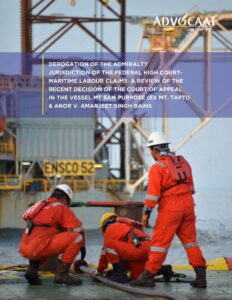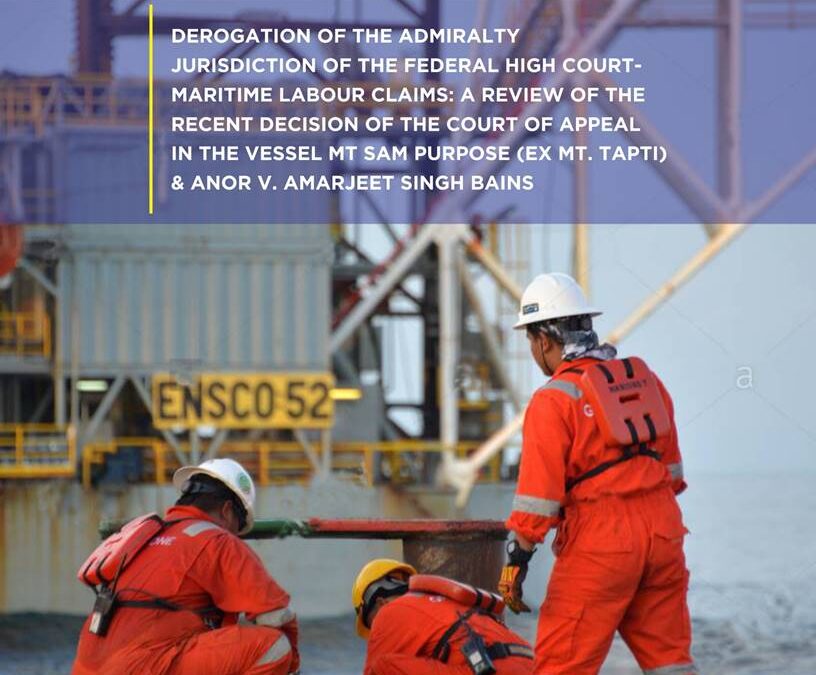
BACKGROUND
The Constitution of the Federal Republic of Nigeria, 1999 (as amended) confers admiralty jurisdiction on the Federal High Court[1]and Maritime labour claims particularly claims by a master or a member of the crew of a ship for wages, falls within the admiralty jurisdiction of the Federal High Court.[2] Recent decisions from the Federal High Court and the National Industrial Court derogates from the admiralty jurisdiction exclusively conferred on the Federal High Court by the Constitution. By these decisions, the Federal High Court lacks the jurisdiction to hear and determine any matter pertaining to unpaid wages of seafarers on the basis that the Constitution has cloaked the National Industrial Court (NIC) with the exclusive jurisdiction to hear and determine all labour and employment matters. Thus the payment or non-payment of crew wages is deemed a labour matter for adjudication by NIC.
One of the advantages of commencing an admiralty action in rem at the Federal High Court is the ability of the Claimant to arrest a vessel as a pre-judgment security for his claim. Claims for seafarer’s wages constitutes a maritime lien on the relevant vessel and as such the vessel may be arrested in an admiralty action in rem as a pre-judgment security for the claim of such wage. The unfortunate consequence of these decisions that claims for seafarer’s wages do not fall within the admiralty jurisdiction of the Federal High Court is that the Claimant loses the opportunity to arrest vessels as pre-judgment security for maritime labour claims.
The case under review examines the basis for the removal of maritime labour claims from the admiralty jurisdiction of the Federal High Court and highlights the implications of the decision for the maritime industry.
BRIEF FACTS
The Respondents commenced an admiralty action in rem at the Federal High Court against the vessel MT Sam Purpose and the Owners of MT Sam Purpose claiming, among other reliefs, the sum of $53,097.51 US Dollars being crew wages owed them in respect of services rendered on board the vessel. By way of a Motion Ex Parte, the Respondents sought and obtained an order of arrest of the vessel as a pre-judgment security for their claims. The Appellant applied to the Federal High Court to set aside the order of arrest of the vessel and to strike out the suit on the basis that the Federal High Court lacked the jurisdiction to entertain claims for crew wages. The Federal High Court dismissed the Appellant’s application. Dissatisfied with the decision, the Appellant appealed to the Court of Appeal. One of the issues for determination before the Court of Appeal was whether payment of crew wages fell within the admiralty jurisdiction of the Federal High Court. The Court of Appeal held that the Federal High Court lacked the jurisdiction to entertain any claim relating to payment of crew wages as the Constitution has vested the National Industrial Court with the exclusive jurisdiction to hear and determine all labour related matters, inclusive of maritime labour matters and crew wages.
BASIS OF THE COURT’S DECISION
The Court of Appeal considered the constitutional provisions conferring admiralty jurisdiction to the Federal High Court. The Court also considered section 2(3)(r) of the Admiralty Jurisdiction Act, 1991 which empowers the Federal High Court to entertain claims for payment of crew wages. The Court also examined the provisions of the Constitution as to the exclusive jurisdiction on the National Industrial Court in respect of labour and employment matters.
Section 251(1) (g) of the Constitution provides as follows:
“Notwithstanding anything to the contained in this Constitution and in addition to such other jurisdiction as may be conferred upon it by an Act of the National Assembly, the Federal High Court shall have and exercise jurisdiction to the exclusion of any other court in civil causes and matters –
- any admiralty jurisdiction, including shipping and navigation on the River Niger or River Benue and their affluents and on such other inland waterway as may be designated by any enactment to be an international waterway, all Federal ports, (including the constitution and powers of the ports authorities for Federal ports) and carriage by sea.”
This constitutional provision is further elaborated upon by the scope of the admiralty jurisdiction set out in sections 1 and 2 of the Admiralty Jurisdiction Act. Section 2(3)(r) of the Admiralty Jurisdiction Act particularly conferred jurisdiction on the Federal High Court to hear and determine claims “by a master, or a member of the crew, of a ship for wages.”
It is on the basis of these provisions that the Federal High Court exercises jurisdiction over payment of crew wages.
The case under review also relied on sections 254C (1)(a) and (k) of the Constitution which provides as follows:
“Notwithstanding the provisions of sections 251, 257, 272 and anything contained in this Constitution and in addition to such other jurisdiction as may be conferred upon it by an Act of the National Assembly, the National Industrial Court shall have and exercise jurisdiction to the exclusion of any other court in civil causes and matters-
- relating to or connected with any labour, employment, trade unions, industrial relations and matters arising from workplace, the conditions of service, including health, safety, welfare of labour, employee, worker and matters incidental thereto or connected therewith;
- relating to or connected with disputes arising from payment or nonpayment of salaries, wages, pensions, gratuities, allowances, benefits and any other entitlement of any employee, worker, political or public office holder, judicial o1Ticcr or any civil or public servant in any part of the Federation and matters incidental thereto.”
The Court of Appeal after considering these provisions held that the purport of section 254C of the Constitution was to confer on the National Industrial Court exclusive jurisdiction over employee wages and other labour-related matters, including seafarer’s wages. The Court declared section 2(3)(r) of the Admiralty Jurisdiction Act null and void for being inconsistent with the provisions of section 254C of the Constitution which the court held to be “clear and unambiguous.” The Court in its decision recognized that section 251(1)(g) of the Constitution vested exclusive jurisdiction on the Federal High Court over admiralty matters which includes claims for crew wages. However giving the literal meaning to the provisions of the constitution in sections 251 and 254c the intent was clear as to the vesting of jurisdiction over crew wages to the NIC.
COMMENTARY
Until the Supreme Court overrules the decision of the Court of Appeal or the Court of Appeal overrules itself, the implication of the decision of the Court of Appeal in the case under review is that:
- Seafarer’s can only resort to the National Industrial Court to enforce all labour-related matters including maritime labour claims as the Federal High Court no longer has the powers to entertain such claims;
2. The law regards crew wages as a maritime lien on a vessel.[3] Maritime liens arise by operation of law and are independent of the seafarer’s employment contract. Prior to the decision of the Court of Appeal in the case under review, maritime liens were enforceable against the vessel in an admiralty action in rem in which the Claimant had the opportunity to arrest the vessel as a pre-judgment security for his claim. Following the decision of the Court of Appeal, claims for payment of crew wages may have lost its status as a maritime lien; and
3. Admiralty actions in rem are commenced against the vessel itself apart from its owners. Now, Claimants would have to bring an action against their employer for payment of crew wages. With claims against the vessel no longer feasible as a result of this decision, Claimants would no longer be able to obtain an order of arrest to secure their claim as the National Industrial Court does not have any admiralty jurisdiction.

Order via legalnaija.com/shop
The decision under review has settled the jurisdictional tussle between the Federal High Court and the National Industrial Court over crew wages. Prior to the Court of Appeal decision, there were conflicting decisions in this regard. In ASSURANCE FOREINGEN SKULD V. MT CLOVER PRIDE[4] the Federal High Court held that the National Industrial Court is imbued with the jurisdiction to deal with actions for unpaid crew wages. In the case of AKUROMA DAWARIKIBU STEPHEN V SEATEAM OFFSHORE LIMITEd,[5] the National Industrial Court in assuming jurisdiction over the subject matter held that the provisions of section 2(3)(r) of the Admiralty Jurisdiction Act and section 254C of the 1999 Constitution (as amended) are in conflict. As such, section 2(3)(r) of the Admiralty Jurisdiction Act was declared void to the extent of its inconsistency with section 254C of the 1999 Constitution. In MOE OO & 26 ORS V MV PHUC HAI SUN,[6] the Federal High Court held that the National Industrial Court does not have jurisdiction in matters relating to unpaid crew wages.
The law is now settled and the claims for unpaid crew wages are exclusively within the jurisdiction of the National Industrial Court. Shipowners, charterers and crew members are to take note of this latest development.
[1] See section 251(1)(g) of the Constitution.
[2] See section 2(3)(r) of the Admiralty Jurisdiction Act of 1991.
[3] See section 67 of the Merchant Shipping Act of 2007 and section 5 of the Admiralty Jurisdiction Act.
[4] Suit No. FHC/L/CS/ 1807/2017
[5] Akuroma Dawarikibu Stephen v Seateam Offshore Limited Suit No. NICN/PHC/124/2017 (unreported) decided by the National Industrial Court, Port Harcourt judicial division on February 24, 2020, Per Hamman J.
[6] Suit No. FHC/CS/L/592/11 (unreported) delivered by the Federal High Court, Lagos Judicial division on June 20, 2014, per Tsoho J

